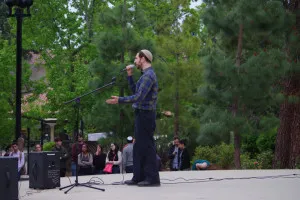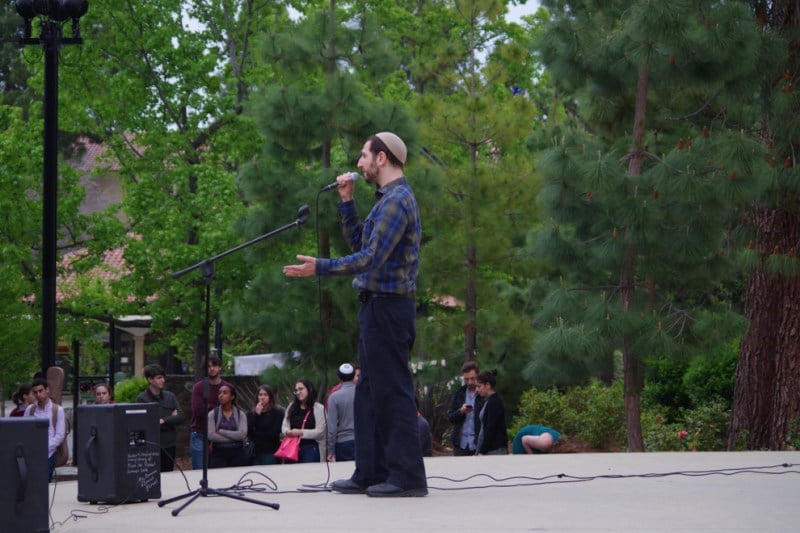The Stanford Jewish community and its allies gathered at White Plaza in a rally against campus anti-Semitism on April 7. Organized by Undergraduate Senate candidate Matthew Wigler ’19, a crowd of about 100 people listened to speeches by Jewish community leaders, heard poetry recitals and sang as a community.

Jewish Students’ Association (JSA) President David Kahn ’17 set the tone in the event’s first speech, saying that the event was “not about a specific person or words said by a specific person.” Kahn was referring to controversial remarks made during the Undergraduate Senate meeting on April 5.
“The intention from my mind is to address the serious concerns of the Jewish students at Stanford, that anti-Semitism on campus exists in implicit and explicit forms, and goes unchallenged,” said Kahn. “It’s not ingrained in the narrative of what should be protected and what should be looked out for.”
J Street U co-chair Eva Borgwardt ’19 echoed Kahn’s call for inclusivity. On behalf of J Street U, she pledged to organize teach-ins and educational events this quarter to combat anti-Semitism.
“[This rally] has created the extremely positive space to start,” Borgwardt said. “We need to call people in rather than call people out.”
Other speakers explicitly addressed the allegedly anti-Semitic comments Senator Gabriel Knight ’17 made on Tuesday.
Senator Molly Horwitz ’16, the author of the controversial bill on anti-Semitism that Knight had been responding to in his remarks, spoke of her experiences as a Jewish Senator.
“A lot of the times the Jewish community doesn’t get a lot of attention, and when it does, often it’s for things that are unfortunately sad,” said Horwitz. “I’ve been on this stage twice in the past year, and sitting on the Senate has really shown me the need for Jewish representation, or just representation of allies from other communities.”
Miriam Pollock ’16, president of Cardinal for Israel, deemed Knight’s apology for his remarks a “very small part apology and very large part further justification of his anti-Semitic remarks.”
“I am disappointed that not a single non-Jew condemned what had been said,” Pollock said, recalling her personal experiences with anti-Semitism at Stanford. “It brought me back to that table in FloMo dining, when no one spoke out for me in freshman year. I want you to please ask yourself whether any other such hate speech would have been let slide by our student Senate.”
Pollock ended by calling on the next Senate to pass the resolution against anti-Semitism, including a clause that deemed demonizing, delegitimizing or applying double standards to Israel anti-Semitic.
Aside from Wigler, five other Senate candidates spoke at the rally. Aron Tesfai ’19, Gabe Rosen ’18, Elliot Kaufman ’18, Brooks Hamby ’18 and Ali Sarilgan ’19 voiced their support of the Jewish community as allies or members.
Sarilgan, the only candidate speaking who was not JSA-endorsed, recalled the anti-Semitism he had witnessed in Turkey.
“I come from a culture where Jewish people are regarded as our worst fear in the world.… Kids who don’t share toys have their parents yell at them and tell them to stop being Jewish,” said Sarilgan. “These macro-aggressions have left a group of people we live with feeling unhappy, unsafe and insecure.”
“Gabe Knight and other people believed bigoted things, and treat Jews differently,” Kaufman argued, openly criticizing Knight’s remarks. “What I always wondered was how do some of these people think they can get away with it?”
“Gabe said that on the question of whether Jews control the government and the media, we couldn’t possibly take a stance on that [because] it’s too ‘politically contentious,’” he added. “Let’s be very clear. The question of the international Jewish conspiracy is contentious only to vile anti-Semites.”
As a community ally, Senate candidate Tesfai also promised, “I will support the vote on the bill against anti-Semitism, including the [clause on delegitimizing, demonizing and applying double standards to Israel]. That will prevent the elected student body from making grossly intolerant and divisive comments.”
The rally took on a more emotional tenor as community leaders recalled personal experiences with anti-Semitism, mingling the incidents on campus with family memory and community identity.
Recalling her family’s history of exile and migration, Julia Sakowitz ’19 said, “I couldn’t think of any of my ancestors who fit the image of sinister Jewish power that the ASSU Senator described.”
“It’s very possible to politically disagree with someone, and still fully respect and honor their identity,” Sakowitz added. “We Jews do it with each other all the time.”
“I think a lot of the time Jewish people focus on celebration with food and happiness and drink, and it’s amazing,” Horwitz said. “But, like creation, we have to focus on darkness – before light was created, darkness enveloped the earth.”
“We have to remember the dark parts of our shared history and the dark things that do happen, even here at Stanford, and rather than thinking we shouldn’t talk about this because it’s Stanford, it’s because we’re at Stanford that we need to talk about this,” Horwitz urged.
Contact Fangzhou Liu at [email protected]
